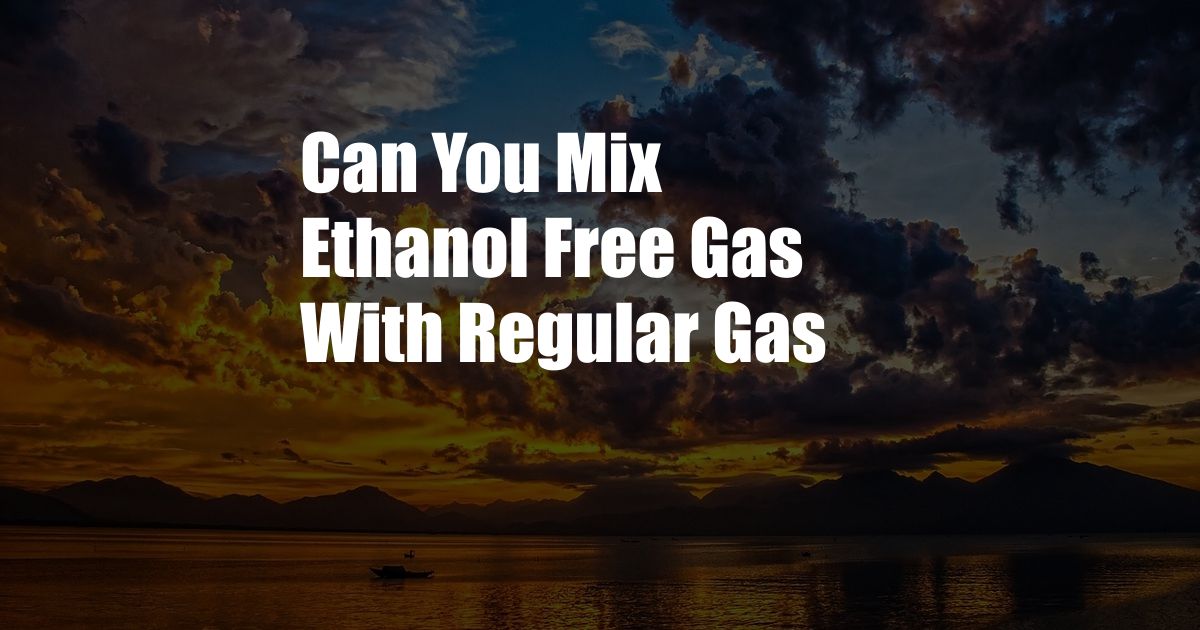
Can You Mix Ethanol-Free Gas With Regular Gas?
In the realm of automotive maintenance, the question of mixing ethanol-free gas with regular gas has sparked curiosity among many drivers. Ethanol-free gas, also known as pure gasoline, is a type of fuel that lacks any ethanol content, while regular gas typically contains varying amounts of ethanol, usually ranging from 10% to 15%.
The presence of ethanol in gasoline has been a subject of debate due to its potential impact on engine performance and fuel efficiency. Ethanol, an alcohol-based additive, is often used as a renewable fuel source and can contribute to reducing greenhouse gas emissions. However, some drivers have expressed concerns about its effects on their vehicles’ engines and fuel economy.
Understanding Ethanol-Free Gas
Ethanol-free gas, as the name suggests, is gasoline that does not contain any ethanol. It is typically derived from crude oil and undergoes refining processes similar to regular gas. The absence of ethanol in this fuel type means it has a higher energy content compared to regular gas containing ethanol.
One of the main advantages of using ethanol-free gas is its potential to improve engine performance. Ethanol can have a slight corrosive effect on certain engine components over time, and its presence in fuel can contribute to the formation of carbon deposits. Ethanol-free gas, devoid of these potential drawbacks, may help reduce engine wear and maintain optimum engine performance.
Mixing Ethanol-Free Gas and Regular Gas
Now, let’s address the burning question: can you mix ethanol-free gas with regular gas? The answer is yes, you can safely mix these two fuel types without causing any harm to your vehicle.
Mixing ethanol-free gas with regular gas will not result in any adverse chemical reactions or engine damage. The ethanol content in regular gas will simply dilute the ethanol-free gas, resulting in a blend with a reduced ethanol concentration. This blended fuel can be used in vehicles designed to run on regular gasoline without any issues.
Benefits of Mixing Ethanol-Free Gas and Regular Gas
Mixing ethanol-free gas with regular gas can offer several potential benefits:
- Improved Engine Performance: As mentioned earlier, ethanol-free gas can contribute to better engine performance by reducing wear and carbon buildup.
- Increased Fuel Efficiency: Ethanol has a lower energy content than gasoline, so using a blend with a reduced ethanol concentration may slightly improve fuel efficiency.
- Reduced Emissions: Ethanol combustion can produce higher levels of certain emissions, such as aldehydes. Mixing ethanol-free gas with regular gas can help lower these emissions.
Tips for Mixing Ethanol-Free Gas and Regular Gas
If you decide to mix ethanol-free gas with regular gas, follow these tips:
- Gradual Mixing: Start by adding small amounts of ethanol-free gas to regular gas and gradually increase the proportion over several fill-ups.
- Avoid Overmixing: While mixing is safe, using excessive amounts of ethanol-free gas can lead to fuel system issues. Aim for a blend that is no more than 50% ethanol-free gas.
- Check Manufacturer Recommendations: Always refer to your vehicle’s owner’s manual for any specific fuel requirements or restrictions.
FAQs on Mixing Ethanol-Free Gas and Regular Gas
- Q: Can I use ethanol-free gas in my vehicle designed for regular gas?
A: Yes, you can safely use a blend of ethanol-free gas and regular gas in your vehicle. - Q: How much ethanol-free gas can I add to regular gas?
A: It is recommended to mix no more than 50% ethanol-free gas with regular gas. - Q: Will mixing ethanol-free gas with regular gas damage my engine?
A: No, mixing these fuel types will not harm your engine as long as you follow the recommended proportions. - Q: Is it better to use ethanol-free gas or regular gas?
A: Ethanol-free gas may offer slight advantages in terms of engine performance and reduced emissions, but regular gas is more widely available and generally more cost-effective.
Conclusion
In summary, mixing ethanol-free gas with regular gas is a safe and viable option for vehicle owners. This practice can potentially enhance engine performance, increase fuel efficiency, and reduce emissions. By following the recommended guidelines and considering your vehicle’s specific requirements, you can make an informed decision about using this fuel blend.
Are you interested in learning more about the effects of ethanol-free gas on your vehicle’s performance and fuel economy? Share your thoughts and experiences in the comments section below.